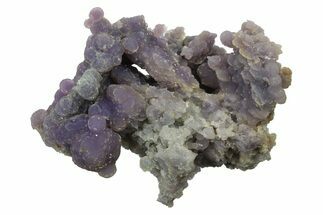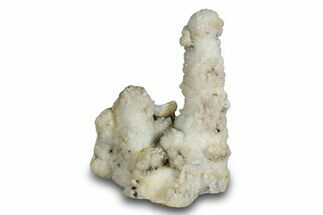This Specimen has been sold.
3.7" Spectacular Botryoidal Grape Agate - Indonesia
This is a top-quality, sparkling purple grape agate specimen from Sulawesi, Indonesia. It shows druzy purple chalcedony formations in a botryoidal structure like a bunch of little grapes, hence this material's name!
It comes with an acrylic display stand.
It comes with an acrylic display stand.
About Indonesian Grape Agate
Grape agate from the Sulawesi region of Indonesia is a captivating and relatively new discovery in the mineral world. This botryoidal (grape-like) formation of purple chalcedony is known for its rich, vibrant colors and unique spherical structures that resemble clusters of grapes. The color spectrum includes deep purples, lavenders, lilacs, and even greenish-blue hues, making each specimen distinct. Occasionally, you’ll find grape agate with white or translucent druzy crystal coatings that add an extra sparkle.
These formations were created over millions of years as silica-rich fluids filled voids and crevices in volcanic rock. As the fluids cooled, they precipitated tiny quartz crystals, which slowly grew in layers to create the nodules we see today. Grape agate’s natural appearance and vibrant colors make it a favorite among collectors and decorators alike, who are drawn to its calming and soothing energy.
While grape agate is sometimes referred to as a form of “chalcedony” or “amethystine botryoidal chalcedony,” its mineral composition and appearance set it apart from traditional agates or amethyst. In metaphysical circles, grape agate is believed to foster inner peace, inspire creativity, and enhance one’s intuition. As a collectible mineral, it’s relatively durable but should be kept out of direct sunlight to prevent color fading.
Grape agate from the Sulawesi region of Indonesia is a captivating and relatively new discovery in the mineral world. This botryoidal (grape-like) formation of purple chalcedony is known for its rich, vibrant colors and unique spherical structures that resemble clusters of grapes. The color spectrum includes deep purples, lavenders, lilacs, and even greenish-blue hues, making each specimen distinct. Occasionally, you’ll find grape agate with white or translucent druzy crystal coatings that add an extra sparkle.
These formations were created over millions of years as silica-rich fluids filled voids and crevices in volcanic rock. As the fluids cooled, they precipitated tiny quartz crystals, which slowly grew in layers to create the nodules we see today. Grape agate’s natural appearance and vibrant colors make it a favorite among collectors and decorators alike, who are drawn to its calming and soothing energy.
While grape agate is sometimes referred to as a form of “chalcedony” or “amethystine botryoidal chalcedony,” its mineral composition and appearance set it apart from traditional agates or amethyst. In metaphysical circles, grape agate is believed to foster inner peace, inspire creativity, and enhance one’s intuition. As a collectible mineral, it’s relatively durable but should be kept out of direct sunlight to prevent color fading.
SPECIES
Quartz var. Chalcedony
LOCATION
Batu Manakarra Mining District, Sulawesi, Indonesia
SIZE
3.7 x 2.45"
CATEGORY
ITEM
#271191
 Reviews
Reviews












